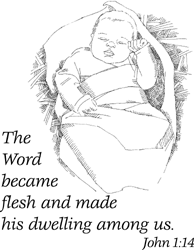
Changed By Grace Community Church began a little over four years ago. And during that time we have been involved in laying the foundation for our ministry. I shared two weeks ago those features that need to be at our foundation: a high view of God, the absolute authority of Scripture, sound doctrine, personal holiness, and spiritual authority. With the recent changes and additions to our ministry, I feel that it is important to share what the Bible teaches about "Christ’s Church." I have been a believer for the past 20 years. And in those 20 years I have seen some drastic things occur in the church. I have seen the respect for leaders decline. I have seen the membership become complacent and apathetic. I have even seen the rise of the "seeker-sensitive church." Therefore my mediation this week has been on the church. Right now I am meeting with a group of men who are studying with me what the Bible teaches about the church, its leaders and its members. This is Christ’s Church. It does not belong to any particular individual or denomination, it belongs to Christ. In Colossians 1:18 Paul said, "He (Christ) is the head of the body, the church, who is the beginning, the firstborn from the dead, that in all things He may have the preeminence." John MacArthur writes, "There are many metaphors used in Scripture to describe the church. It is called a family, a kingdom, a vineyard, a flock, a building, and a bride. But the most profound metaphor, one having no Old Testament equivalent, is that of a Body. The church is a Body, and Christ is the head of the Body. This concept is not used in the sense of the head of a company, but rather looks at the church as a living organism, inseparably tied together by the living Christ. He controls every part of it and gives it life and direction. His life lived out through all the members provides the unity of the Body (cf. 1 Cor. 12:12–20). He energizes and coordinates the diversity within the Body, a diversity of spiritual gifts and ministries (1 Cor. 12:4–13). He also directs the Body’s mutuality, as the individual members serve and support each other (1 Cor. 12:15–27). Christ is not an angel who serves the church (cf. Heb. 1:14). He is the head of His church" (The MacArthur NT Commentary: Colossians). The Greek word for "church" is ekklesia which comes from kaleoµ "to call," and ek "out from." The compound verb means "to call out from." In classical Greek ekklesia referred to an assembly of the citizens summoned by the town crier. It is used in Acts 19:32–41 in its purely classical meaning. The town clerk dismissed the citizens who had been gathered together by the craftsmen of
The Formation of the Church
The church was formed in eternity past by God. Ephesians 1:3-6 says, "Blessed be the God and Father of our Lord Jesus Christ, who hath blessed us with all spiritual blessings in heavenly places in Christ: According as he hath chosen us in him before the foundation of the world, that we should be holy and without blame before him in love: Having predestinated us unto the adoption of children by Jesus Christ to himself, according to the good pleasure of his will, To the praise of the glory of his grace, wherein he hath made us accepted in the beloved" (KJV). God decreed before the foundation of the world those whom He would save and He gave them to Jesus Christ. This is the church invisible. The church visible to the world is the local ekklesia. It was formed by the Holy Spirit on the day of Pentecost (see Acts 2:1-4, 22-41).
The Purpose of the Church
There are three purposes given in the New Testament for the churches existence. The first is to glorify God. Ephesians 3:20 says, "Now to Him who is able to do exceedingly abundantly above all that we ask or think, according to the power that works in us, to Him be glory in the church by Christ Jesus throughout all ages, world without end. Amen." The church must perceive itself as an institution for the glory of God. Everything we do whether we "speak...minister, let him do it as with the ability which God supplies, that in all things God may be glorified through Jesus Christ" (1 Pet.4:11). God is glorified when His children are equipped for ministry. Ephesians 4:11-15 tells us that God gave gifted men to the church "to equip the saints for the work of ministry" (v.12). That will happen as the Word is preached and taught faithfully and systematically. The third purpose of the church is to evangelize the lost. Mark 16:15 says, "And He said to them, 'Go into all the world and preach the gospel to every creature.'" This is what Matthew 28:19 refers to as making disciples.
God has birthed His church before eternity past to glorify His name by equipping His saints and evangelizing a lost world. Are you fulfilling this call on your life? My prayer for you today is that you will seek to glorify God by serving Him with the gifts He has given you to minister in the Body.






















